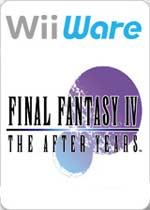Having been remade twice in recent years – for the Game Boy Advance in 2005 and in 3D on the DS last year – Final Fantasy IV should still be relatively fresh on the minds of many JRPG enthusiasts. In fact, you might even be among those who’ve wondered what life was like for Cecil and his pals following that nasty final run-in with the soul-obliterating and curse-inducing Zeromus. It seems Square Enix is all but banking on these preconceptions, with its decision to launch Final Fantasy IV: The After Years – a nine-part full-blown sequel to the classic.
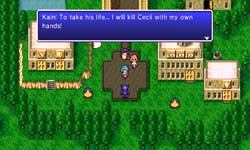
The idea of a new, episodic, retro Final Fantasy series certainly rolls off the tongue a bit oddly, but dishing out another helping of RPG epic-ness in smaller, bite-size servings is bound to make the entire thing more digestible for newcomers. The first meaty portion of this continuing adventure (the focus of this review) is now out, and it certainly whet our appetite for future installments. Unfortunately, the ability to fully understand and appreciate the plot twists in The After Years hinges heavily on players having experienced Final Fantasy IV in some form or another. Complete that exhaustive feat before coming back for seconds, and you’ll find the rewards well worth the effort.
Following Capcom’s recent lead in making Mega Man 9 so absolutely retro-delicious that it could be easily mistaken for an original Nintendo game circa the late 1980s, developer Matrix Software has crafted The After Years in similar fashion. The result resides somewhere in the gray area between gloriously nostalgic and tragically outdated. However, once you get over the initial shock of how tremendously old-school the game looks and feels, the SNES-era graphics (polished up just a tad), a catch-yet-repetitive chiptune soundtrack, and bucket loads of random encounters to button-mash through are comfortingly familiar. Anyone who’s spent time with early Final Fantasy games on the NES and SNES will quickly find themselves drawn into the intriguing story.
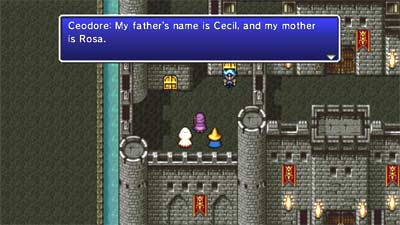
The destruction of Zeromus in Final Fantasy IV leads to a time of reconstruction and peace where the paladin Cecil and white mage Rosa settle down, marry, and rule benevolently over the Baron kingdom. Set long after those fateful events, the first chapter of The After Years marks the return of the second moon and mysterious evil forces that descend upon the kingdom with malicious intent towards its rulers. The story follows their son Ceodore, an aspiring knight, who accepts the aid of a mysterious stranger to track down his missing parents. Packed full of surprise twists, numerous changes in character perspective, and overlapping plot elements, the somewhat brief tale ebbs and flows nicely. Aside from a few new faces, you’ll cross paths with many old favorite characters on your travels, though becoming further reacquainted with them is mostly left up to future episodes to explore. The action builds up nicely in intensity before dropping you with a cliffhanger ending that makes the thought of shelling out for upcoming chapters hard to resist.
Looking beyond all the golden oldies elements in the game, you’ll find a few interesting new mechanics worked into the mix. The most noticeable change is how the different phases of the moon impact the gameplay. As you adventure along, the moon will gradually cycle, strengthening or weakening melee attacks, special powers, white magic, and black magic depending on which phase it falls on. You can speed up the process by sleeping at an inn or using a tent, and it can largely determine how tough or easy certain portions of the game are. Since you have to gauge whether it’s worth changing the lunar phase every time you reach a save point and need to restore health and magic points, this adds another layer of strategy into the gameplay. Making the wrong choice can spell a quick and painful end for your adventurers.
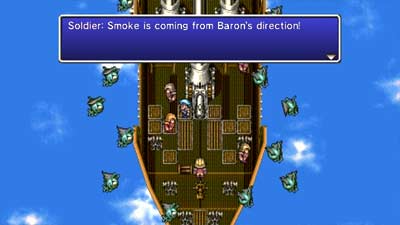
The After Years also introduces a new banding system that lets various characters in your party team up to deliver super powerful attacks. Band attacks must be uncovered through experimentation in battle with different characters engaging in different tasks simultaneously. Noodling around pays off if you do uncover a new attack, but failing to do so simply wastes your party members’ turns in combat. Also, certain characters come and go frequently, so it’s often tricky to remember to test out combinations when the plot fires up. This system will likely get a lot more play as the chapters continue.
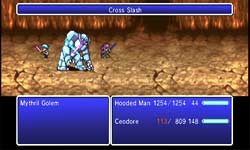
Since the main characters focused on in the debut chapter are fighter variants, random encounters (of which there are many) quickly devolve into blind single-button mashing exercises. You’ll have some white magic spells and a few special abilities at your disposal at different times, but these skills are really only necessary during boss encounters and rare occasions where you bump into a tougher batch of baddies. This will hopefully be remedied in future expansions as different character types with special abilities and broader magic powers to draw from return.
Clocking in at about five to six hours with a minimal amount of level-grinding required, the core portion of The After Years progresses very linearly, driven heavily by the story. Being railroaded through the adventure without much freedom to deviate from the main path isn’t as much of an issue as you’d expect. Even though you’ll re-tread some of the same locations, similar terrain, and even tackle a few boss encounters from Final Fantasy IV, the strong plot progression makes it worthwhile. In the coming months, a series of shorter side quest chapters revolving around individual characters’ stories that tie into the main plot will be released, and completing them will let you import character data from each into the final lengthier chapter slated for release later this year.
The After Years is an unusual experiment for the Final Fantasy franchise, but it’s one that’s already working its powerful magic on us. The story is smartly structured to tease you along, intermittently revealing important and interesting tidbits, before leaving you hanging. Rydia’s Tale, the first of the optional DLC chapter installments, is already available to ease the withdrawals that set in. This series is a must have for Final Fantasy IV addicts, though new players might be scratching their noggins trying to keep up. Stay tuned for our additional review coverage as the series progresses.
RATING OUT OF 5 RATING DESCRIPTION 3.7 Graphics
Retro, SNES-era graphics are initially disappointing but grow on you. 3.7 Control
The classic Wii Remote control setup works, though you’ll be mashing a single button most of the time. 4.0 Music / Sound FX / Voice Acting
Repetitive chiptune tracks largely culled from FFIV are still upbeat and very enjoyable. 3.8
Play Value
This solid debut nicely lays the foundation for a slew of DLC and an eventual conclusion chapter planned for later this year. Overall, this episodic series shows a lot of promise.
3.8 Overall Rating – Good
Not an average. See Rating legend above for a final score breakdown.
Game Features:
